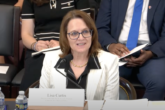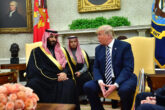October 02, 2019
Situation Report: U.S.-North Korea Negotiations to Resume This Weekend
After months of stalled talks, U.S. and North Korean representatives will meet this weekend to resume negotiations over North Korea's nuclear weapons program. Just this week, however, the North Korean government claimed that it had successfully tested a ballistic missile launched from a submarine. As the two sides prepare for renewed talks, what does the path forward for U.S. policy, North Korea's weapons program, and the relationship between the two countries look like?
CNAS experts continue to sharpen the conversation surrounding the future of U.S.-North Korea negotiations. In the reports below, revisit a variety of approaches that U.S. policymakers can pursue.
- Duyeon Kim, Adjunct Senior Fellow for Asia-Pacific Security: "My concern is Pyongyang publicly framing the upcoming talks as preparations for a summit statement—this so far doesn’t sound like serious, substantive negotiations for a comprehensive roadmap. Negotiations need to be given a chance to function properly. It would be bad news if the pre-Hanoi process repeats itself in which the nuclear issue is not ‘allowed’ to be discussed at the working level. Both sides should test one another through direct talks and a real nuclear deal, and not by gauging intent and objectives from afar based on public commentaries and actions."
- Elizabeth Rosenberg, Director & Senior Fellow for Energy, Economics, and Security: "In the talks ahead, the United States will be challenged to consider what kind of inducements, including sanctions relief, will motivate North Korea to demonstrate meaningful progress on denuclearization while simultaneously preserving U.S. leverage to act in case North Korea backtracks. The United States has refrained from exposing and punishing North Korea's flagrant circumvention of sanctions for many months in an apparent effort not to sour the nascent bilateral nuclear diplomacy. However, this posture makes the U.S. negotiating position in the coming talks more difficult, and leads many to wonder whether the United States will demand enough from North Korea in exchange for economic relief to the rogue state."
- Kristine Lee, Associate Fellow for Asia-Pacific Security: "Washington has long seen Pyongyang strictly as a liability—but with a bit of ingenuity, there are also unique opportunities to turn North Korea into a strategic asset in the context of the United States’ broader strategy toward Northeast Asia. This requires Washington to break out of its traditional bilateral approach toward negotiations with North Korea and operate based on a deeper understanding of the interests, redlines, and long-term ambitions of our allies and competitors in the region: Japan, South Korea, Russia, and China. What is the Venn diagram of strategic interests whereby Washington can manage down the North Korea threat while also strengthening its alliances and its posture in Northeast Asia vis-à-vis China?"
- Van Jackson, Adjunct Senior Fellow for Asia-Pacific Security: "President Trump’s publicly declared willingness to arrange a fourth meeting with Kim Jong Un jeopardizes working level talks with North Korea before they even begin. Achieving a mutual accommodation that stabilizes the Korean Peninsula requires the United States to recognize that Pyongyang thinks it is in a position of bargaining strength, and that leader-level meetings without working-level agreements harm the overall diplomatic effort."
- Neil Bhatiya, Associate Fellow for Energy, Economics, and Security: "At the heart of any renewed diplomatic process will be the vexing question of how to structure sanctions relief in response to proportional moves by North Korea to roll back its weapons of mass destruction and ballistic missile programs. So far, the administration has been reluctant to outline such a framework, preferring instead a 'big for big' dynamic in which complete sanctions removal is dependent on complete denuclearization. That strategy has plainly not worked. If the administration wants to demonstrate progress, it should clearly delineate a series of intermediate sanctions relief steps that will be undertaken provided North Korea abides by verifiable steps to slow or partially dismantle their own program."
Revisit three recent CNAS reports about the future of U.S. policy toward North Korea:
Risk Realism
In a new report, Dr. Van Jackson argues that while pursuing North Korean denuclearization is ideal for U.S. national interests, it is no longer realistic for the near-term fut...
Negotiating Toward a Denuclearization-Peace Roadmap on the Korean Peninsula
In a June 2019 report, Duyeon Kim writes that “the road ahead remains as uncertain as ever” for negotiators from the United States and North Korea....
Negotiating With North Korea
In a February 2019 report about negotiations between the United States and North Korea, experts Patrick M. Cronin and Kristine Lee predict that “either sufficient progress is ...
More from CNAS
-
Game Over?
The trade wargame suggests that sustained high tariffs could create leverage and urgency to spur action toward a productive restructuring of the international trade system....
By Emily Kilcrease & Geoffrey Gertz
-
Assessing the Terror Threat Landscape in South and Central Asia and Examining Opportunities for Cooperation
Watch...
By Lisa Curtis
-
Middle East Security / Energy, Economics & Security
Trump Inks $600 Bn Deal In Saudi Arabia | Musk, Blackrock CEO Flank Trump In Gulf VisitIn today's episode of India Global, U.S. President Donald Trump secured a $600 billion commitment from Saudi Arabia on Tuesday to invest in the United States. NDTV's Gaurie Dw...
By Daniel Silverberg
-
Energy, Economics & Security / Technology & National Security
Tariffs and Tech: An Uncertain RecipeHigher tariffs could prompt American cloud companies to shift more of their capital investments abroad....
By Pablo Chavez







